International Conference “Resilient and Transforming Europe”
OPENING PLENARY
Chair: prof. Ewa Mińska-Struzik
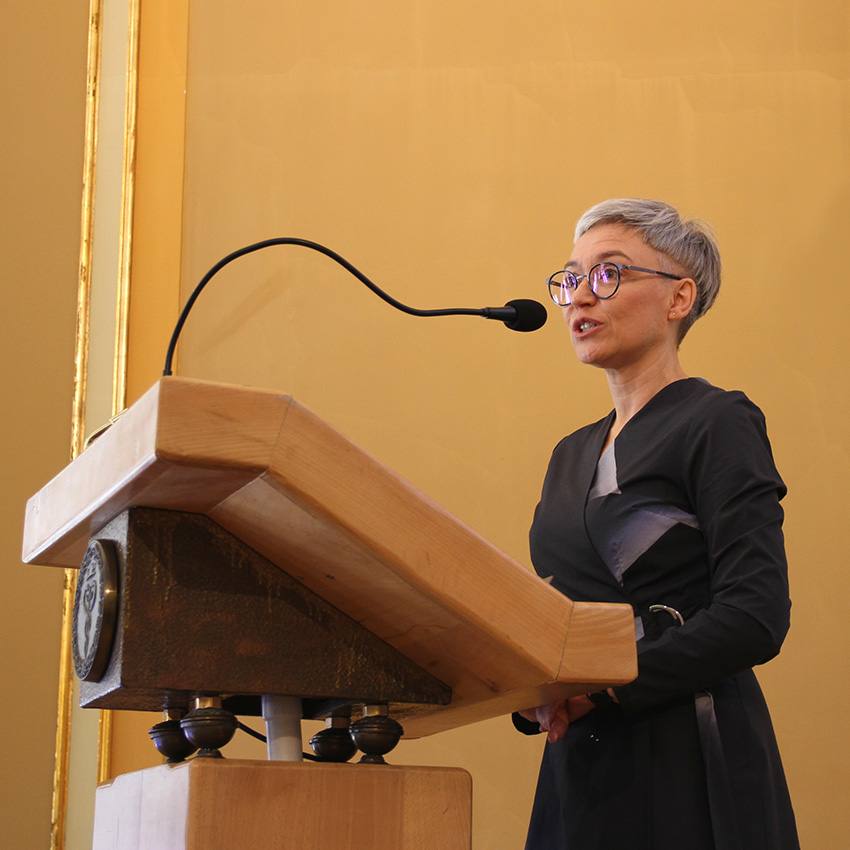
The “International Conference Resilient and Transforming Europe,” held at the Poznań University of Economics and Business on May 9-10, 2024, was opened by the Director of the Institute of International Business and Economics, Prof. Ewa Mińska-Struzik. This was followed by an opening address by the Rector of the Poznan University of Economics and Business, Prof. Maciej Żukowski. Lastly, Prof. Ida Musiałkowska, the academic coordinator and member of the research and teaching staff of the Jean Monnet Centre of Excellence (JMCoE) “Resilient and Transforming Europe” (Transform EU), which co-organized the conference, gave her address.
During the opening plenary, chaired by Prof. Ewa Mińska-Struzik, there were three keynote speeches by Prof. Laura Polverari from the University of Padova in Italy, Prof. Rob van Tulder from RSM Erasmus University and academic director of the Partnerships Resource Centre in the Netherlands, and Prof. Marzena Weresa from the Warsaw School of Economics in Poland.
Prof. Laura Polverari explored the concept of the European Union in the age of permacrisis, sharing opportunities, lessons learned, and prospects for the Union. She posed the central question: What kind of Union do we want to live in, and what kind of Union do we want to create? She highlighted the importance of excellence in research and teaching. Prof. Polverari emphasized that we are currently living in a state of permanent crisis, or even multiple, interconnected crises. However, crises can transform into opportunities if lessons are learned and retained. She used the COVID-19 pandemic as an example, which led to innovations in the EU regarding Europeanization, breaking old paradigms, and developing a new modus operandi. The key questions remain whether these lessons will last and what new lessons should be learned.
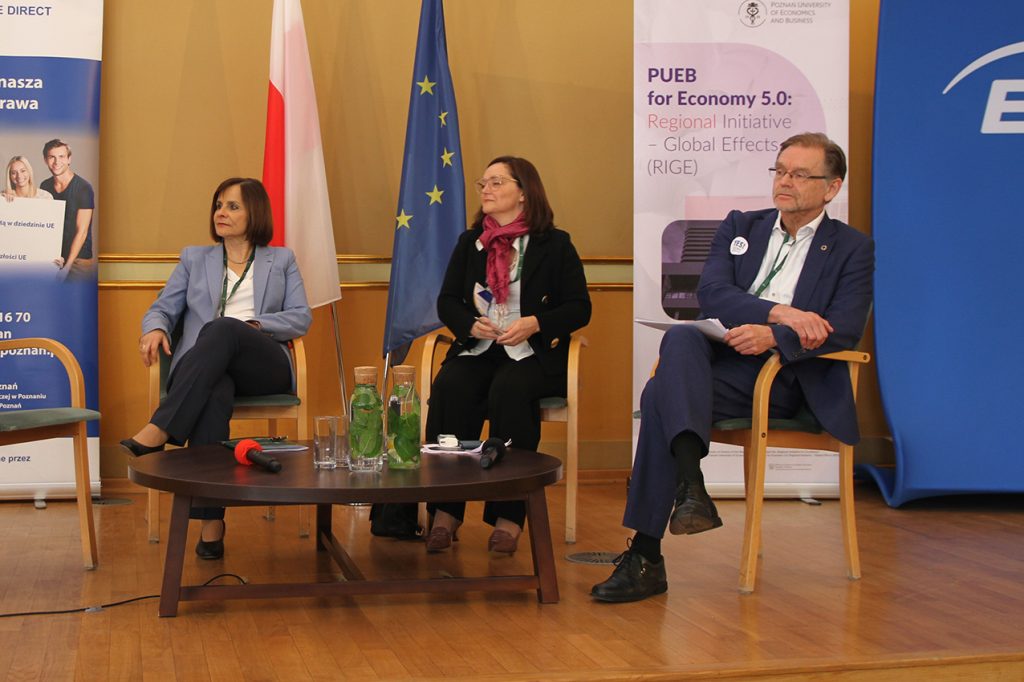
Prof. Rob van Tulder continued the narrative of crisis as an opportunity in his speech, indicating that a good (poly)crisis, or even a cascade of crises bringing increasingly interconnected risks and challenges, should never be wasted. In the short term, Prof. van Tulder mentioned the cost of living crisis, and in the long term, the climate crisis. He stressed the need for investing in sustainability to enhance Europe’s resilience. He deliberated on navigating between liberal capitalism and state capitalism, presenting the relative resilience of Eastern Europe and the success of Poland. Among the pending issues, he mentioned insufficient integration, especially in the financial, energy, and telecommunications sectors, and the need for a level playing field.
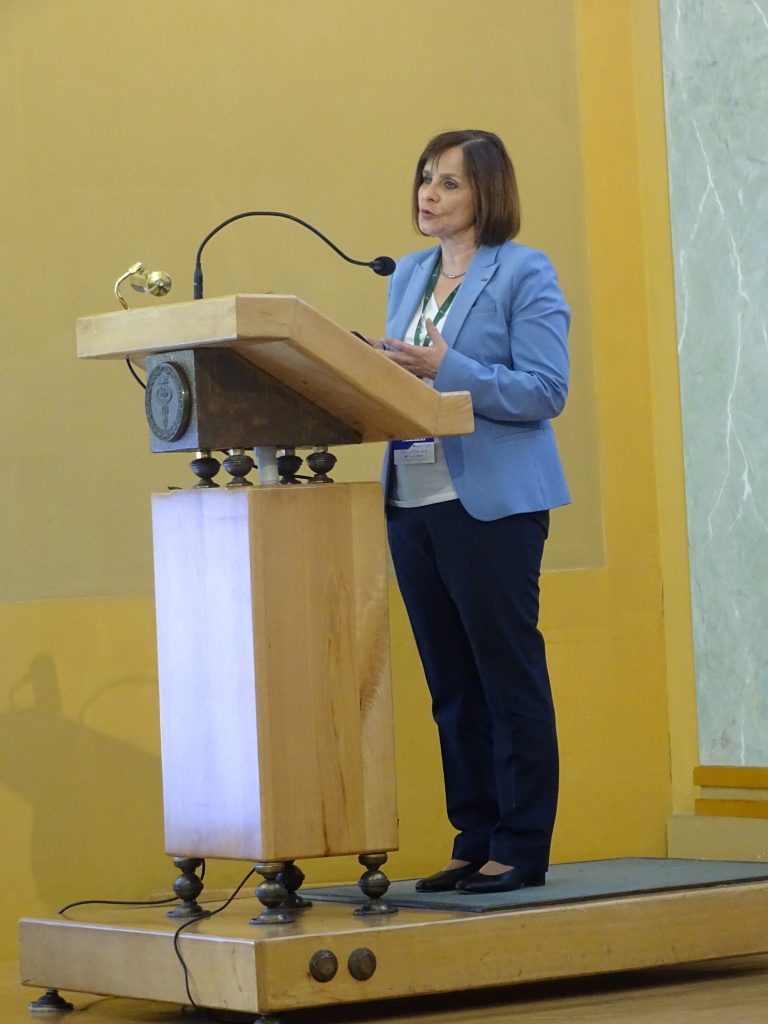
Prof. Marzena Weresa discussed new areas of research on competitiveness, focusing on digitalization and sustainability during turbulent times in the EU. She highlighted the opportunities that new aspects of competitiveness, such as the ability to increase environmental and social sustainability, provide in adjusting to external and internal shocks. Prof. Weresa expanded the definition of competitiveness to include aspects of environmental and social sustainability, resilience, and relational capital. She emphasized that theory should meet practice, and new directions in competitiveness must be determined, such as Industry 4.0, digital innovation, and green innovation.
SESSIONS
“Impact of twin (green and digital) transformation on cross-border trade in goods and services”
Chair: Milena Ratajczak-Mrozek
The first parallel panel, chaired by Prof. Milena Rajaczak-Mrozek, addressed the issues and impacts of the twin (green and digital) transformations on cross-border trade in goods and services. The panelists included Andżelika Kuźnar from the Warsaw School of Economics in Poland, Joanna Stefaniak from the University of Gdańsk, and Cao Trang from the Vienna University of Economics and Business in Austria.
Andżelika Kuźnar highlighted the significant impact of economic sanctions on the trade dynamics between Iran and the EU. She emphasized the declining role of the EU in trade with Iran, noting that China has emerged as Iran’s largest trade partner. Additionally, Russia’s share of trade with Iran has increased in recent years. Prof. Kuźnar also discussed the challenges and opportunities that arise in times of global transformation concerning these trade shifts.
Joanna Stefaniak raised the issue of economic integration in business services, focusing on the legal and engineering sectors. She posed the question of whether the integration processes in the EU have led to a reduction in the restrictiveness of national regulations within the EU market. Stefaniak conducted a comparative analysis from 2014 to 2019 using a gravity model. Her findings indicated that EU integration processes have indeed decreased the significance of national regulations as barriers to the flow of these services within the internal market.
Cao Trang explored the relationship between sustainability disclosure and firm performance in developing countries. She emphasized that the UN Millennium Development Goals and Sustainable Development Goals (SDGs) have influenced companies to integrate sustainable strategies into their operations. To gain a comprehensive understanding of sustainability disclosure, she conducted a literature review and intends to conduct research among companies in ASEAN countries.
“Internationalisation and competitiveness of businesses and industries in times of environmental, technological, geo-economic, and geopolitical transformation (part 1)”
Chair: Marian Gorynia
The panel, chaired by Prof. Marian Gorynia, was the first part of a broad discussion on the internationalisation and competitiveness of businesses and industries in times of environmental, technological, geo-economic, and geopolitical transformation. The panelists included Oriekhova Tetyana from the Vasyl’ Stus Donetsk National University, Tamás Szintia from the Ludovika University of Public Service and Martin Dangerfield from the University of Wolverhampton.
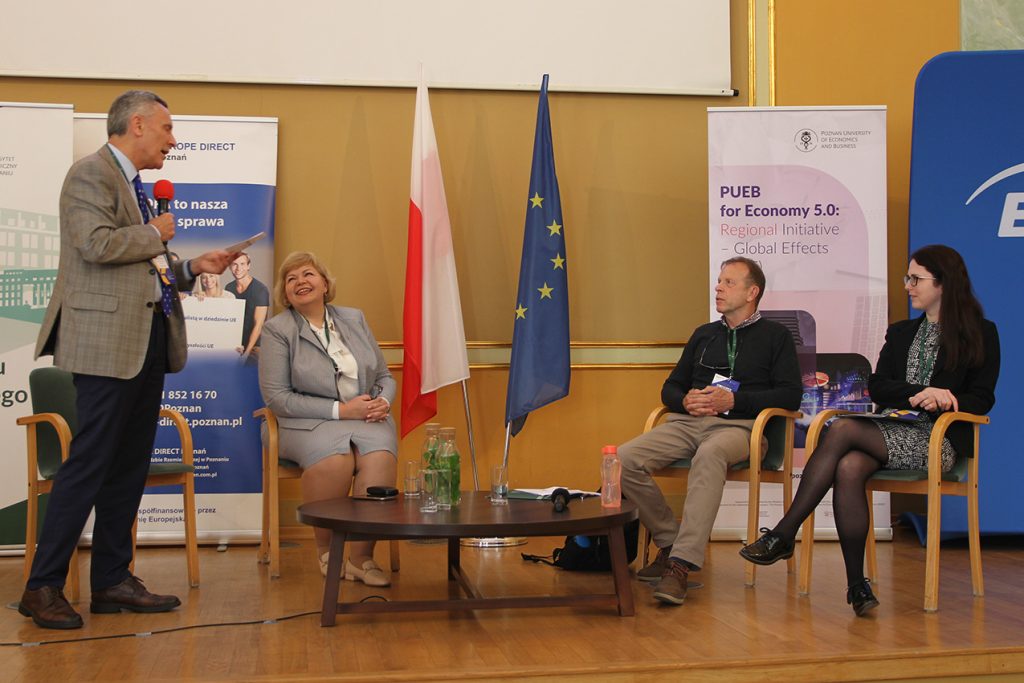
The panel, chaired by Prof. Marian Gorynia, was the first part of a broad discussion on the internationalisation and competitiveness of businesses and industries in times of environmental, technological, geo-economic, and geopolitical transformation. The panelists included Oriekhova Tetyana from the Vasyl’ Stus Donetsk National University, Tamás Szintia from the Ludovika University of Public Service and Martin Dangerfield from the University of Wolverhampton.
Prof. Oriekhova Tetyana started with the presentation of the official congratulations letter on the 20th anniversary of Poland’s membership in the EU from the Rector of the Vasyl’ Stus Donetsk National University. In her presentation she included the historical perspective of EU-Ukraine co-operation, highlighting the milestones in bilateral integration process and main elements of the association agreement. Prof. Oriekhova also stressed that the Russian invasion of Ukraine has accelerated the re-orientation of Ukrainian trade and economic relations towards deeper and faster integration with the European Union. She also presented main economic reforms to be implemented in Ukraine in the coming years and challenges related to the reconstruction of the country after the war.
Tamás Szintia presented the challenge of aligning V4’s energy policies with EU climate neutrality goals. She presented the comparative analysis of energy sectors in the analyzed countries, stressing differences between energy production sectors, as well as implemented and planned projects/actions providing independence from the import of energy from Russia. The general conclusions included that within the analyzed group Poland is the most dependent on carbon energy. Tamás Szintia also underlined a need to improve distribution networks and regulatory capacity, which would place a heavy burden on V4 countries in the coming years.
Martin Dangerfield in his presentation asked the question about the future and integrity of V4 in the context of the war in Ukraine. He underlined many political events (the state of democracy, Russian invasion of Ukraine, Brexit) from the latest past and differences in political approach presented by individual V4 states. He stressed that the Russia-Ukraine war unveiled the biggest political differences within the Group, but at the same time he presented that the V4 co-operation includes many different aspects. In conclusions he underlined that all Group’s countries recognize the benefits of the V4 co-operation (e.g. platform for the V4 to pursue mutual interests in the EU, low-cost initiative) and there is a lack of incentives to cancel the co-operation despite some differences.
„Building resilient supply chains in the post pandemic era: A focus on Europe”
Chair: Katarzyna Mroczek-Dąbrowska
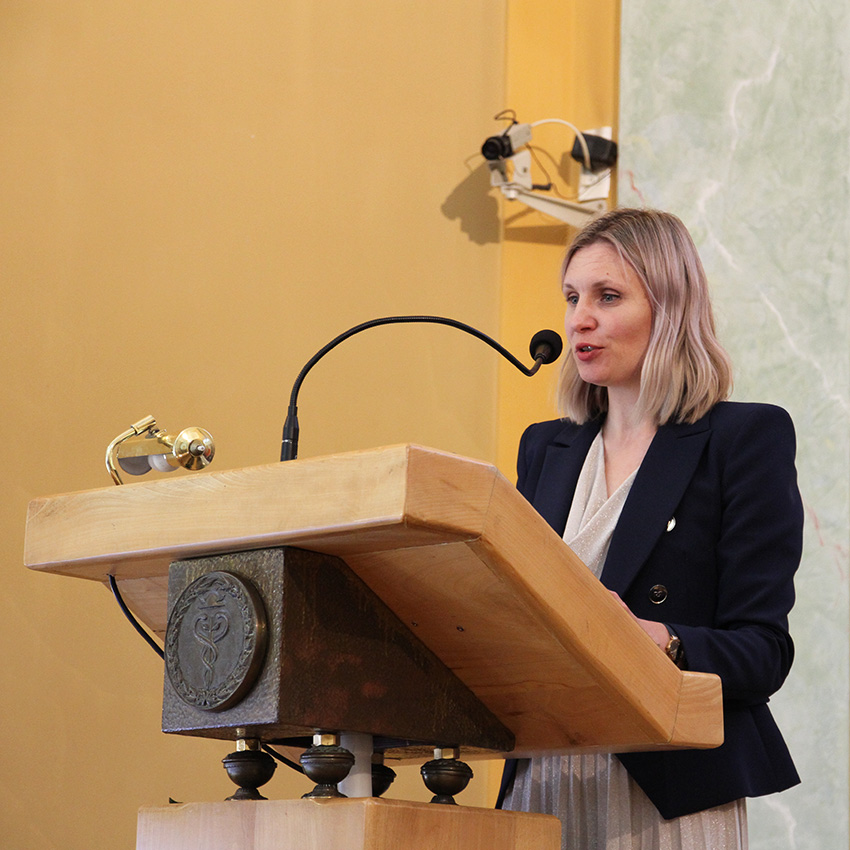
The panel entitled “Building Resilient Supply Chains in the Post-Pandemic Era: A Focus on Europe,” was chaired by Katarzyna Mroczek-Dąbrowska. The panel included Paweł Pasierbiak from Maria Curie-Skłodowska University in Lublin, Sebastian Bobowski from Wroclaw University of Economics and Business, Adam Ambroziak from the Warsaw School of Economics, and Bartosz Michalski from the University of Wrocław.
In their joint presentation, Paweł Pasierbiak and Sebastian Bobowski presented research on the participation of VISE4 countries in global value chains using the gross export measurement method. They emphasized that EU membership has increased the comparative advantage of VISE4 countries. These countries are connected more by their geographical location than by their history, culture, politics, and economy. Trade liberalization in VISE4 countries has contributed to both de-industrialization and reindustrialization. The VISE4 countries are predominantly integrated into the European value chain. However, there is a decreasing European share and an increasing share of Asian countries, particularly China. Competition between VISE4 countries is observed, suggesting they might serve as an alternative to Asian markets.
Adam Ambroziak presented the new EU Industrial Policy in a resilient and transforming Europe, underscoring that the EU was initially established on the basis of coal and steel. Thus, the key instrument of the new industrial policy is reindustrialization. To increase competitiveness, the new industrial policy should focus on R&D, high value-added sectors, and green policies. The new EU Industrial Policy leads to distortions of competition in the EU Internal Market. Unfair competition from the US and China, the energy crisis, potential pandemics, and market failures pose significant challenges.
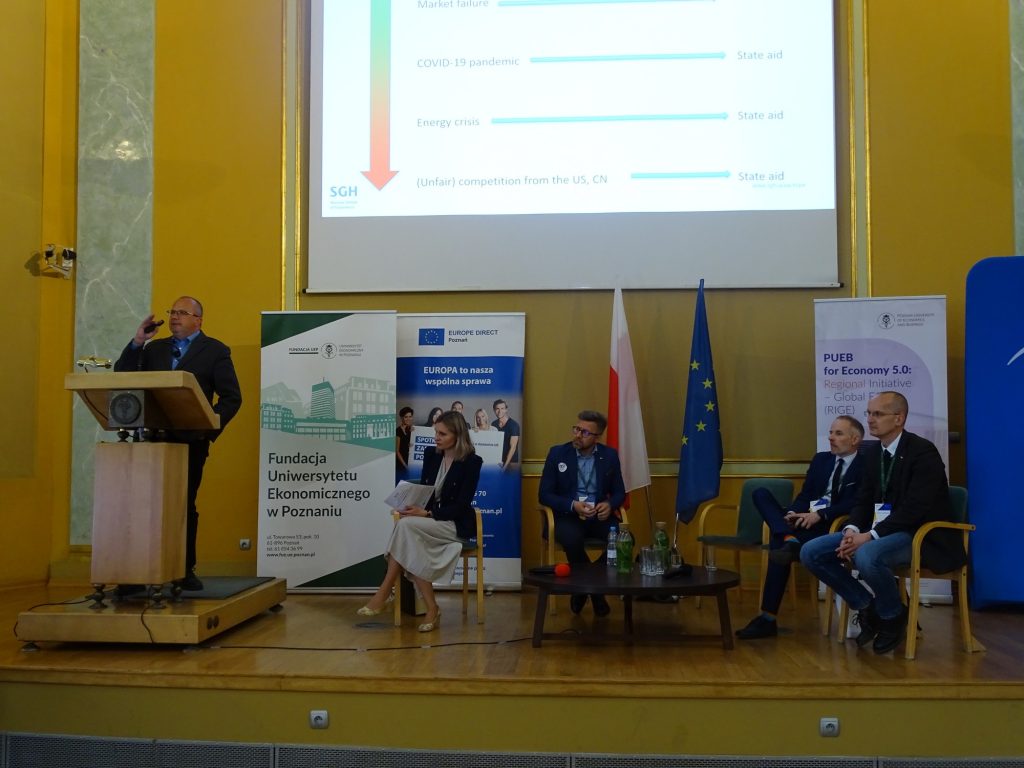
Bartosz Michalski highlighted critical dependencies on China in international trade, presenting a comparative study of V4 economies. His research findings indicated growing shares of Chinese value-added in V4 manufacturing exports as well as in V4 final demand. He emphasized that understanding economic exposure to China is crucial for EU policymaking in terms of resilience and structural competitiveness. Finally, he presented the concept of de-risking from China within the EU’s strategic autonomy program
AIB-CEE PLENARY SESSION (hybrid format)
Building Resilient Ukraine in New Geopolitical Realities: What are the implications for international business theory and practice?
Chair: Łukasz Puślecki
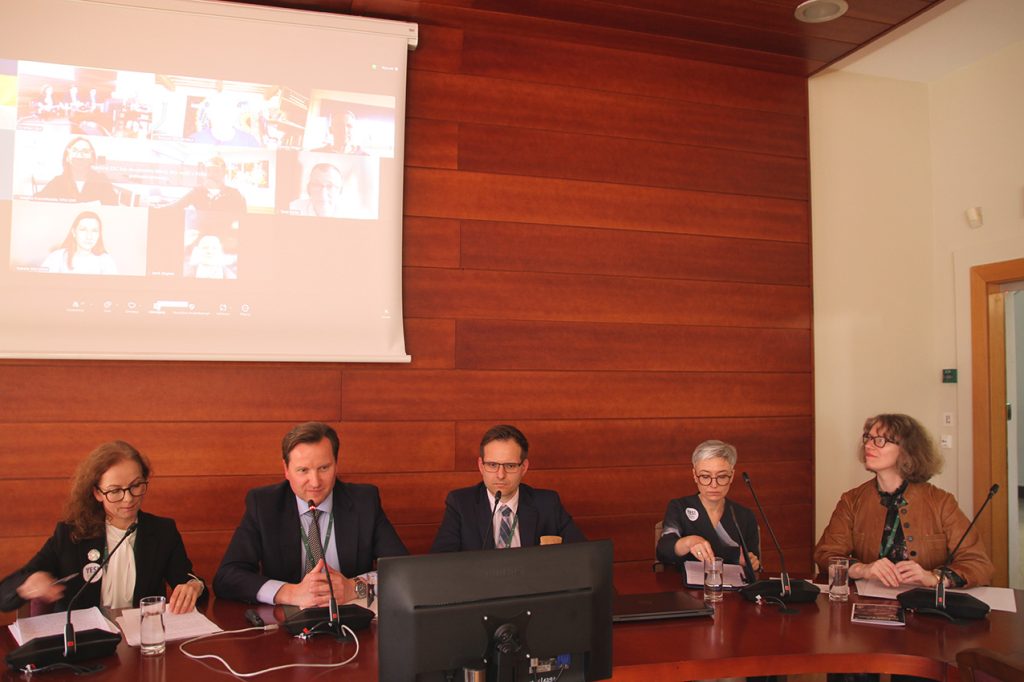
AIB-CEE Plenary Session, chaired by Łukasz Puślecki and organized in a hybrid format, was dedicated to important and current discussion on the implications for international business theory and practice from the Russia-Ukraine war and potential reconstruction of the Ukraine’s economy and business after the conflict. The session was attended by numerous AIB members and the following panelists: Lukasz Puślecki (AIB-CEE Chapter Chair) from the Poznań University of Economics and Business (Poland), Taras Danko from the National Technical University Kharkiv Polytechnic Institute (Ukraine), Nataliia Krasnokutska from the Comillas Pontifical University (Spain)/National Technical University Kharkiv Polytechnic Institute (Ukraine), Vas Taras from the University of North Carolina at Greensboro (USA), Lorraine Eden from the Texas A&M University (USA), Andreja Jaklic from the University of Ljubljana (Slovenia), Barbara Jankowska (Rector-Elect of the Poznań University of Economics and Business (Poland)), as well as Ewa Mińska-Struzik, Ida Musiałkowska and Piotr Trąpczyński (Vice-Chair AIB-CEE Chapter) from the University of Economics and Business (Poland).
The session was an excellent opportunity to ask questions arising around the conflict and its implications for international business and further development of research/study in IB, such as: implications of the Russian invasion of Ukraine for international business theory and practice; key frontiers for IB research and policy on MNCs and violent conflicts; the role of MNCs in facilitating economic recovery, sustainable and local development; questions about the current state of academic knowledge on the alignment of MNCs’ business practices with international development principles; or the influence of geopolitical changes and international institutions on economic and business environment in Ukraine.
The interesting and fruitful discussion led to some general conclusions. Violent conflicts can be treated as a shock event (high threat, short-time) and as such may require research methods for events analysis. The current IB analysis must be made in the context of geopolitical situation and risks and no one remains fully resilient in dynamically changing world. However, crises and rising geopolitical risks stimulate building resilience and sustainability of MNEs.
The panelist also stressed the important role of MNEs in resolving crisis situation, especially in long-term perspective. The reactive role (companies observe the situation and provide some assistance but do not actively participate) may evolve towards more proactive role of MNEs in leading initiatives and anticipating future needs. MNCs’ contributions to long-term sustainability transitions require a broader systemic approach, greater collaboration among stakeholders and a deeper commitment to addressing root causes of instability and inequality. In this context the IB must include into the analysis also other important aspects such as geopolitics or sustainable development, and this new comprehensive analysis requires also more qualitative approach. This naturally requires more multidisciplinary teams (including e.g. political theory scientists). Current MNE face multiple and interrelated challenges related to resilience, digitalization and sustainability and as such require multidisciplinary analysis.
“Internationalisation and competitiveness of businesses and industries in times of environmental, technological, geo-economic, and geopolitical transformation (part 2)”
Chair: Barbara Jankowska
The panel entitled “Internationalisation and Competitiveness of Businesses and Industries in Times of Environmental, Technological, Geo-economic, and Geopolitical Transformation,” chaired by Barbara Jankowska, included two presentations. The first was a joint work by Tomasz Dorożyński and Anetta Kuna-Marszałek from the University of Łódź, and the second was by Natan Waśniowski from the University of Warsaw.
Tomasz Dorożyński and Anetta Kuna-Marszałek presented their research on the impact of host country governance quality on attracting FDI to the EU-13 member states over 2004-2022. Their study revealed that institutional issues and governance quality are primary determinants of FDI. Countries with high institutional quality attract and retain companies with foreign capital. The EU remains the most attractive investment location globally, boasting a prime regulatory framework.
Natan Waśniowski attempted to unveil the pillars of the European economic security strategy, providing a multifaceted assessment of competitiveness in strategic sectors of the EU. He emphasized that the EU is more than just a market, highlighting its role in promoting, protecting, and partnering. Furthermore, he noted that the European Union is evolving its strategy in this context.
During the discussion, Prof. Katarzyna Nawrot raised the issue of the opposite impact of low-quality governance on attracting FDI from certain countries and to certain industries, questioning whether this was observed in the research conducted by Dorożyński and Anetta Kuna-Marszałek. Prof. Nawrot also noted that low-quality governance and totalitarian states might attract FDI under certain conditions. Prof. Weresa stressed that attracting FDI is not enough; benefiting from it is also crucial.
Managing business and social relationships by resilient and sustainable companies
Chair: Paweł Śliwiński
Tha panel entitled “Managing business and social relationships by resilient and sustainable companies” chaired by prof. Paweł Śliwiński, included three panelist: Aleksandra Nacewska-Twardowska from the University of Łódź, Castelli Chiara from the Wiener Institut für Internationale Wirtschaftsvergleiche and Kamilla Marchewka-Bartkowiak representing the Poznan University of Economics and Business.
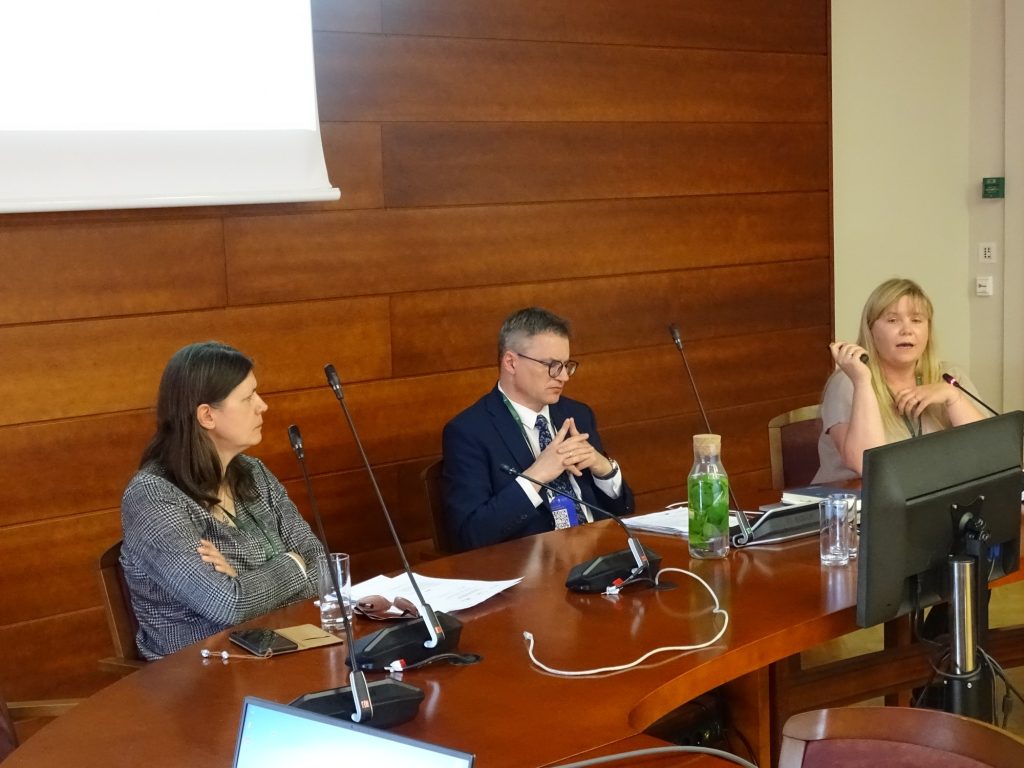
Aleksandra Nacewska-Twardowska delivered the presentation “Unraveling the Dynamics of Central and Eastern European Countries in the Global Value Added Trade Network: A Social Network Analysis Approach”. In her presentation, Dr Nacewska-Twardowska took up the issue of importance/role of CEEC in their trade networks, combining in her analysis both social network analysis and value added trade data. She also presented different centrality indicators and their usefulness in determining the significance of the country within trade networks. General conclusions revealed that Poland, the Czech Republic (those two also on the page rank) and Hungary are the most influential nodes in the network, while the Baltic countries and Bulgaria playing the least important role.
Castelli Chiara in her presentation “Understanding the reshoring phenomenon in the EU. Are multinational companies returning home?” explored the issue of Foreign Direct Disinvestments. The presentation included a broad review of research/literature on the “negative FDIs”, their theoretical background and the role of distance in FDD decisions. It was underlined there are still some knowledge gaps, especially in the area of MNEs disinvestment decisions. The general conclusion from the analysis on almost 6 thou. EFTA MNEs in years 2019-2022 was that the foreign disinvestments are not ‘easier’ than the domestic ones. Castelli Chiara also underlined the importance of further research in the context of current global trends (including reorganization of global trade and business networks).
The last presentation on “Climate policies and carbon-neutrality transition – impact assessment on electricity prices across European Union member states” was a joint study by presenting Kamilla Marchewka-Bartkowiak, Boitan Iustina Alina and Iorgulescu Filip Teodor from the Bucharest University of Economic Studies. The current debate whether the rising prices of conventional and strategic materials used for the production of energy as well as the implementation of various climate policies to support carbon neutrality and stimulate the production of renewable energy trigger the question about their influence on the rise of electricity prices. In this context the authors asked the question whether there was robust evidence of a significant pass-through effect caused by the rise of carbon prices (as one of the most important incentives to the decarbonization of the economy), as well as other factors related to the energy market and climate policies to the electricity prices. The authors came to interesting conclusions: the annual average auction prices of the EU ETS and its fiscal affect exert the influence on electricity prices for households, but no impact on the prices of non-household sector; energy and environmental taxes, energy efficiency investments and the use of renewable energy follow the same pattern (impact only on household electricity prices); the prices of conventional and part of strategic materials appear to be the main determinants of electricity price for non-household consumers.
Roundtable: ESG and beyond – a debate with business leaders
Chair: Piotr Trąpczyński
Expert discussant: prof. Rob van Tulder
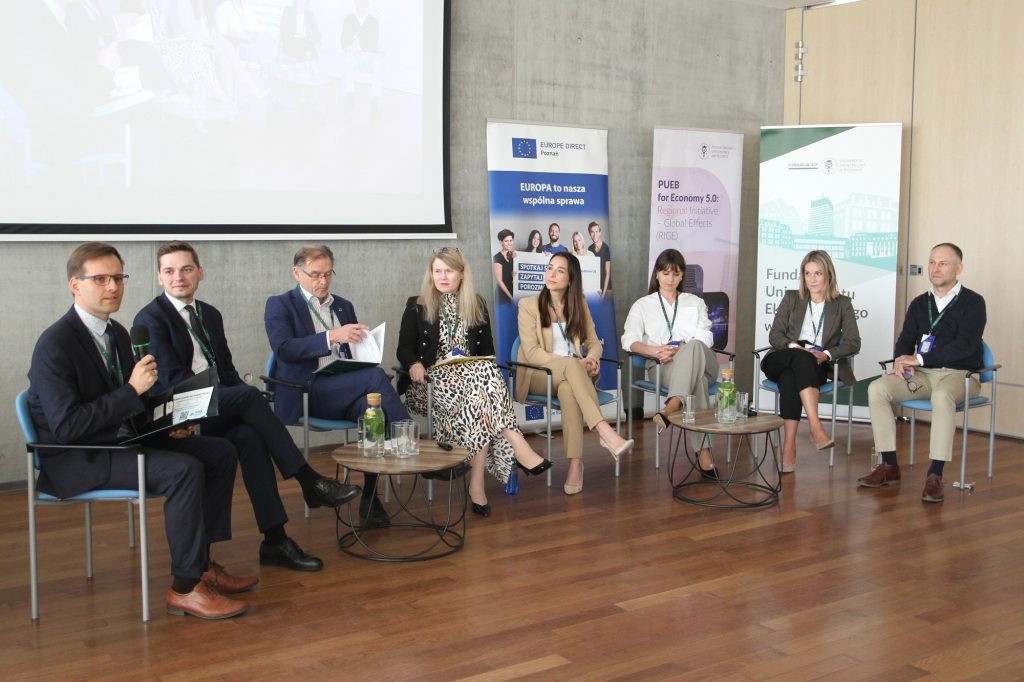
The roundtable chaired by Piotr Trąpczyński with expert support by prof. Rob Van Tulder gathered numerous participants and experts in ESG from Polish and international companies:
- Kinga Baran (Product Manager, WithSecure),
- Katarzyna Kosel (Member of the Board, MAKRO Cash & Carry Poland),
- Jakub Paduch (Attorney & Sustainability Expert, Wielkopolska Development Fund),
- Krzysztof Panek (CEO, Browar Fortuna),
- Maja Rutkowska (Group Human Resources Director, Amica),
- Agata Stańda (Chief Strategy & Sustainability Officer, SOLARIS Bus & Coach).
The discussion raised around important questions related to the concept of ESG and its implementation in companies: do companies regard ESG as a costly obligation or as a strategic opportunity; in which aeras of corporate sustainability ESG provide the biggest synergy with the company’s business; and what are the biggest challenges faced by companies in implementing corporate sustainability.
Most of discussants underlined that ESG had been an important element of their strategies for years. While it is becoming more important for companies to provide eco-friendly products and operations, it might be still a challenge for SME, where approach and strategy is more based on owner’s attitude to the issue. In this context ESG must not be seen only as a cost-inducing obligation, but rather as an element of proper business strategy and cost-effective approach. Sustainable production, services and products become also a requirement from consumers.
During the debate it was commonly accepted that ESG must be linked to core business activities and not treated only as an obligatory reporting issue. In this context it was also underlined that ESG should induce a new approach and business planning. This requires also a new financing model, as sustainable business models must be supported by sustainable financing. Investments in ESG may be financially profitable, but it may also require new methods of financial/profits calculations.
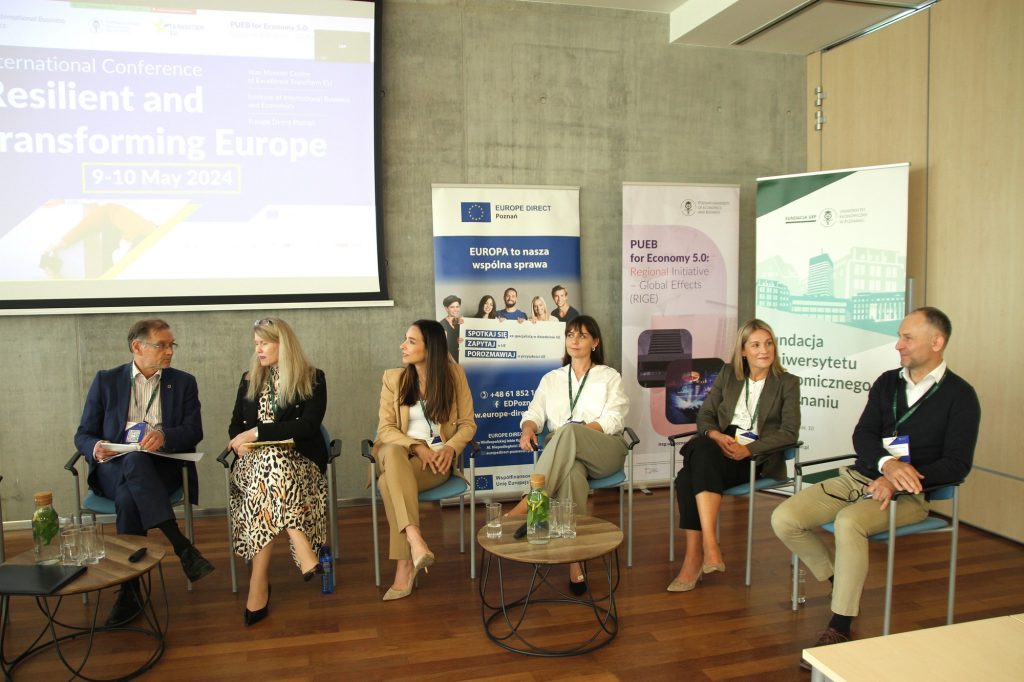
While many companies (including public ones) are open and willing to implement ESG in their strategies, they face many difficulties and do not know how to do it. ESG must be seen not as a reporting system (and corresponding efforts), but more as an opportunity to evolve towards more sustainable business models. It was also underlined, that despite mentioned challenges and problems, European companies are leaders in implementing ESG, while companies in other world’s regions stay behind the process.
Transformation of the European Union and its transformative role in the world (Session in Polish)
Chair: Ida Musiałkowska
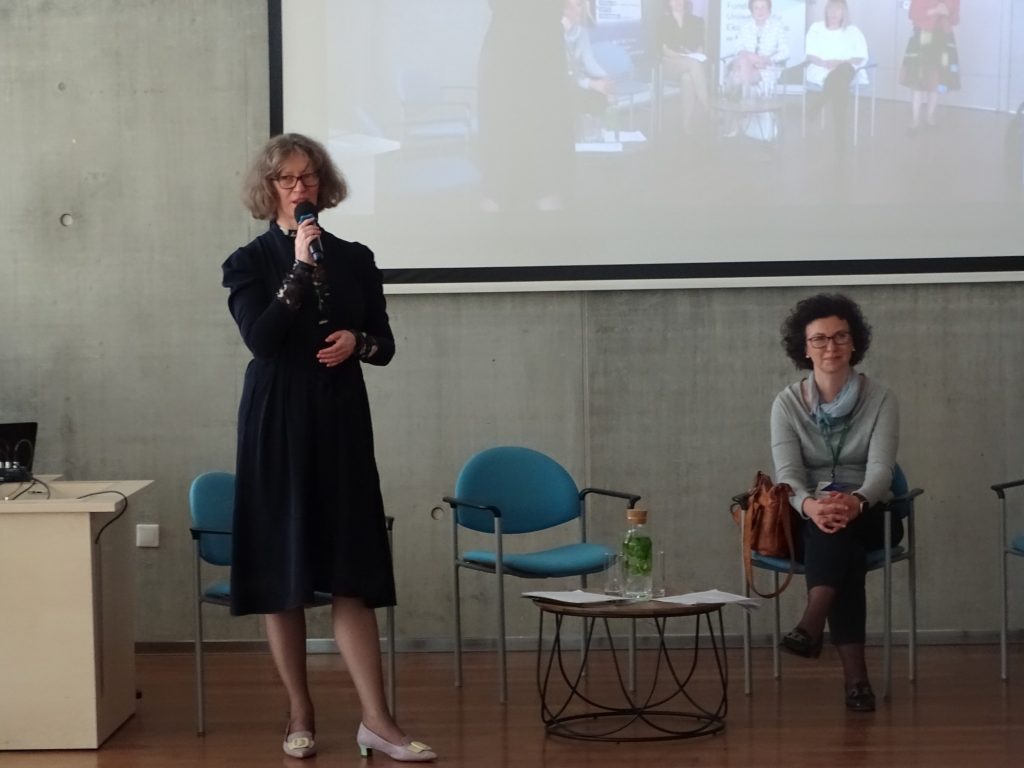
The very last plenary session chaired by prof. Ida Musiałkowska was entitled “Transformation of the European Union and its transformative role in the world”. The session included four panelis, namely Jerzy Menkes from Warsaw School of Economics, Agnieszka Kłos from Warsaw School of Economics, Krzysztof Falkowski from Warsaw School of Economics and Małgorzata Czermińska, Joanna Garlińska-Bielawska and Marta Ulbrych from Cracow University of Economics.
Jerzy Menkes presented the issue of the European Union in the face of the collapse of the international economic order. He emphasized that the future of Europe could not be predicted, and the international order did not collapse on its own but was dismantled. No one foresaw the collapse of the international order. The Professor highlighted the significant efforts of European countries to maintain this order and the importance of the European Union as a guarantor of security, as evidenced by the great European solidarity in the current geopolitical situation. He also noted that political systems are changing through trade. Finally, the professor pointed out the scale of aid to Ukraine, which can only be assessed comprehensively.
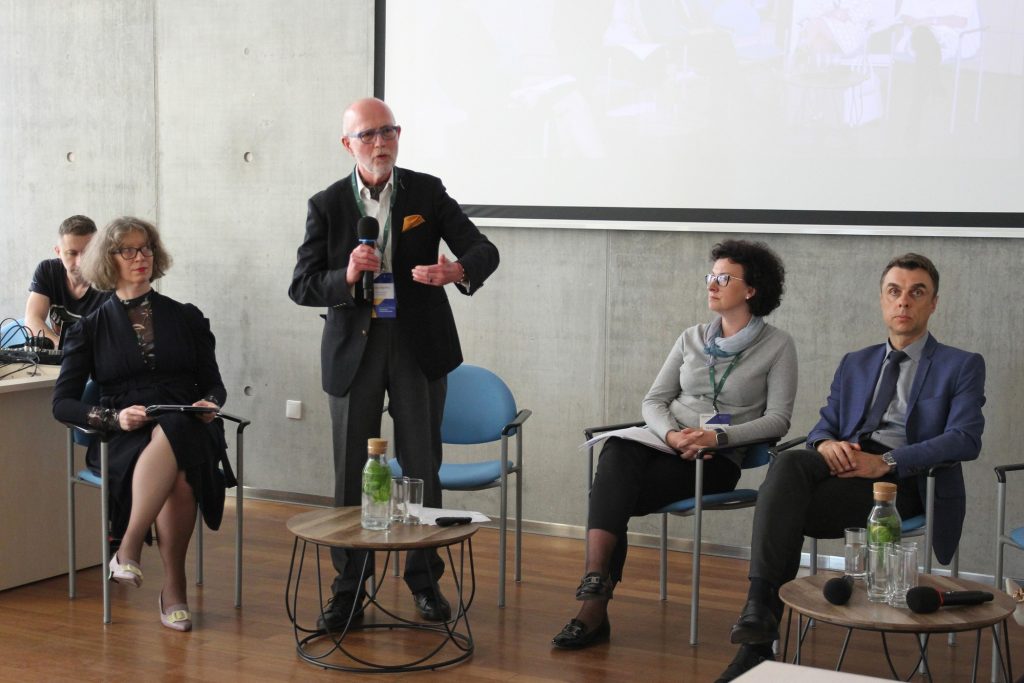
Agnieszka Kłos continued the discussion on the challenges and dilemmas faced by the EU in the context of fiscal policy and enforcement mechanisms. The importance of this issue is related to the aspect of coordination and the competencies of member states. Agnieszka Kłos emphasized the importance of policy coordination at the EU level and the necessity of shared policy goals. Fiscal policy coordination can also be a response to or a remedy for crisis situations. At the same time, she pointed out the risks associated with the excessive use of fiscal policy instruments for both preventive and corrective purposes. The importance of independent institutions in shaping fiscal policy was also highlighted. It is crucial to consider the social aspect in EU programs.
Krzysztof Falkowski presented the issue of eco-innovation in the European Union in the context of sustainable development. Professor Falkowski conceptualized eco-innovation and eco-innovativeness and highlighted the factors determining the development of eco-innovativeness. He also presented the level of eco-innovativeness and its relationship with the achievement of the Sustainable Development Goals (SDGs). He stressed that despite existing challenges and barriers to the development of eco-innovativeness, the EU remains a leader in implementing eco-development policies. Improvements in innovation have been observed in all EU countries except Romania. Besides, the acceleration of digitalization has contributed to reduced use of wood and paper. There is a clear relationship between eco-innovativeness and the achievement of the SDGs. While there is convergence in the realization of the SDGs within the EU, at the individual country level, there is a reverse process concerning eco-innovativeness. Some countries are leaders, while others, including Poland, lag significantly behind and much remains to be done, although social awareness is steadily increasing.
Małgorzata Czermińska, Joanna Garlińska-Bielawska, and Marta Ulbrych highlighted the potential for cooperation between the European Union and selected countries of the Southern African Development Community (SADC) in light of the Economic Partnership Agreement (EPA). They explained the trade policies of SADC countries and discussed the establishment of EPA agreements. Overall, marginal changes in trade were observed, with significant trade volume increases only in the cases of South Africa (RSA) and Angola. Moreover, the increase in trade turnover was primarily in imports, while exports were dominated by natural resources. Czermińska, Garlińska-Bielawska, and Ulbrych’s analysis provides a comprehensive view of the potential and challenges in the EU’s economic partnership with SADC countries, emphasizing the importance of trade liberalization, the dominance of natural resource exports, and the transformative potential of such agreements. The question remains about the transformative role of the EU in SADC countries.